When you first adopt a kitty, you will notice them making all sorts of funny little noises. Other kittens can be extremely quiet and will never learn to meow much at all. But as an overall generalization, there is a timeframe when kitties start meowing, laid out below.
When do kittens start meowing? Kittens can start to meow between the ages of 7 to 16 weeks old. Before this point, they can make little grunts and whines 2 to 3 weeks after being born. Some kittens won’t meow much at all as they grow older.
Here’s more detail on what to expect from your kitten’s voice, and some related information further down the page – including when kittens can start to meow at strangers.
When will my kitten start meowing?
You might be wondering when your kitten will start to vocalize and meow. Well, for the first few weeks of life, most kittens will be relatively silent, and you may not hear any noises from them at all.
Put simply, feline communication is far more complicated than you might first think. And because of this, there is no straightforward answer to when your kitten will start meowing as soon as they are capable of doing so – because they might not do.
It’s not uncommon for some kittens to not meow at all; unless they learn to do so from another cat. In fact, many owners can go months without hearing their kittens meow.
As a real-life example, my cat rarely meows. I can probably count on one hand how many times I’ve heard him meow since we got him as an 8 week old kitten.
There are also other factors that come into play like the cat’s personality and temperament. Both can play a big role in whether a kitten is silent or meows.
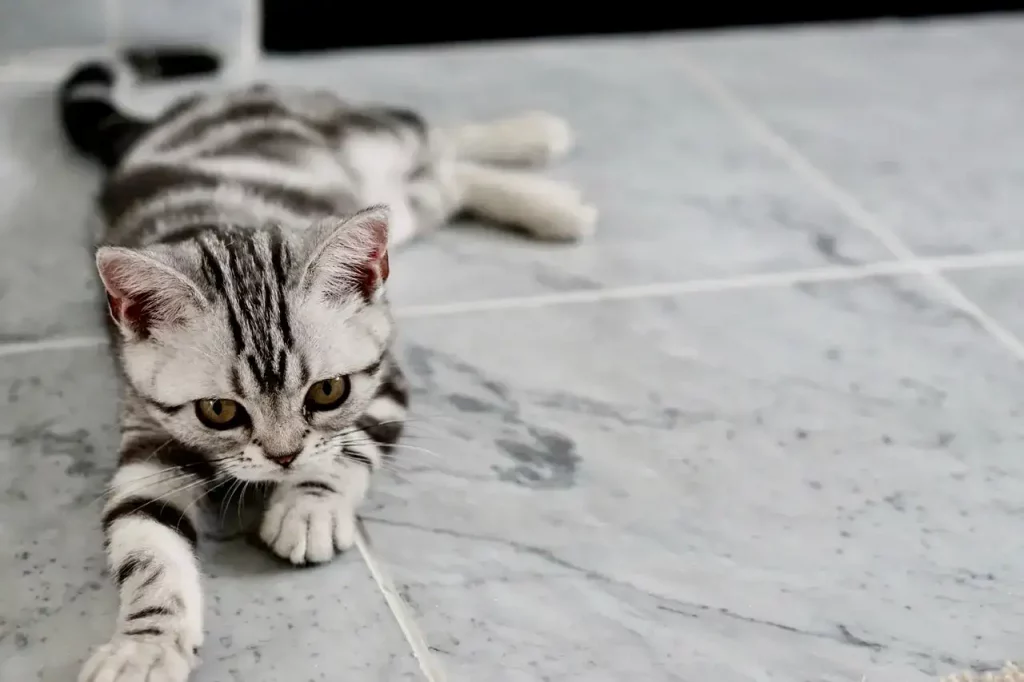
Despite this, most kittens will eventually learn to meow, be it from another cat, or through discovering it themselves.
However, a lot of kittens will learn to meow pretty early on in their lives (to the dismay of a lot of owners). At first, young kittens will begin to vocalize through whining or other small sounds, usually to signal displeasure or to alert their mother to something: often their need for milk.
Nevertheless, it is important to realize that this will only happen once their eyes have opened, and for the first few weeks of their lives, they will be virtually silent.
Do 8-week-old kittens meow?
Normally, once 8 weeks have passed, kittens will become more experienced with vocalizing, and they may begin to start meowing, sometimes as early as 6 weeks. These meows will not carry the same strength as an adult cat’s meow and will be much shriller and higher in comparison.
When does a kitten’s meow get deeper?
In fact, most kittens’ first meows will sound more like yowls than anything, which is even true for larger breeds.
Eventually, however, their vocal cords will begin to strengthen, and gradually their meows will begin to sound more reminiscent of an adult cat meow.
Handy Hint: To find out how often you should deworm a kitten, read more here.
How do you stop a kitten from meowing all the time?
Due to this, an older kitten’s habit of meowing can quickly become bothersome for both owners and neighbors alike, especially when they are left alone for long periods. You might not want your kitten to start meowing at strangers or the door all the time.
Particularly boisterous kittens can meow all day long, whilst nervous kittens may meow at any unexpected noises when left by themselves.
Separation anxiety can also be another reason why a kitten might meow, and this often goes hand in hand with other negative behaviors such as property destruction.
Although this may not be a worry for owners who live in a quiet neighborhood, it can be a pain for owners who live in cities or busy residential areas. It is a fact that kittens will eventually grow into adult cats, and unless it is addressed, habitual meowing can become an even bigger problem as they get older.
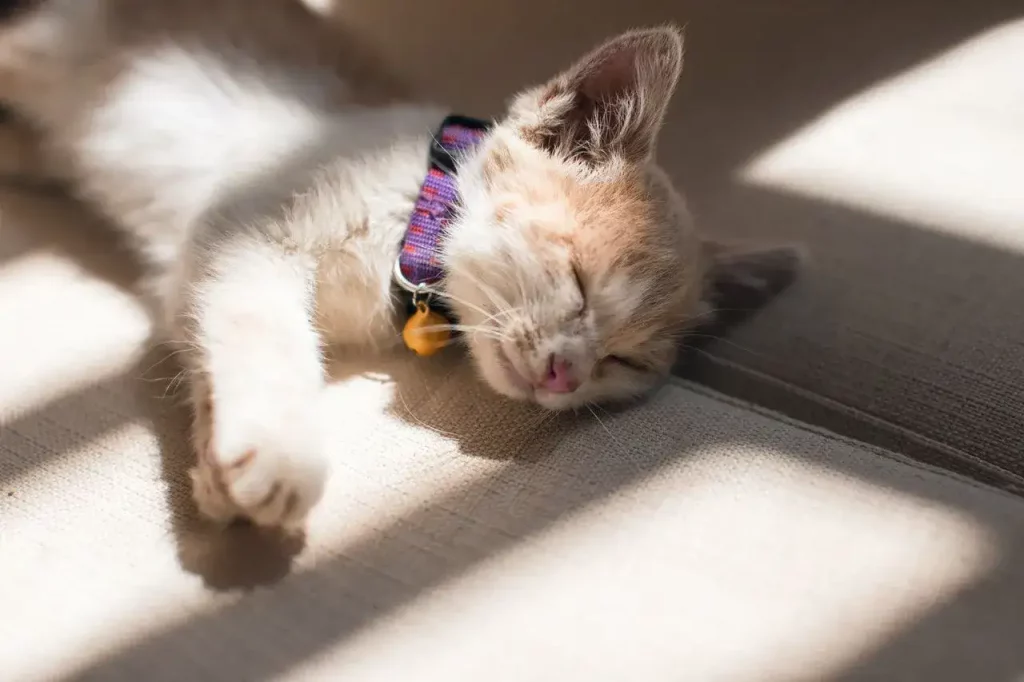
If like me, you live next door to a cat who meows constantly, you will be aware of how annoying and frustrating this can be. Thankfully, there are several things we can do to limit this sort of behavior in our kittens.
Firstly, it is a good idea to try and figure out what is triggering the meowing in your kitten. As mentioned before, this can be caused by several different things, ranging from separation anxiety to the personality of your cat.
If you own a particularly adventurous kitten they may meows out of boredom or pent up energy, for example. Likewise, a nervous kitten may meow out of fear of unknown noises, or at things going on outside the house – like strangers walking past.
Handy Hint: To find out why kittens breathe so fast when sleeping, read more here.
Helping an adventurous kitten to stop meowing can sometimes be as simple as spending a little more time playing with them or taking them out for extra or longer walks. Once they are tired, most kittens will calm down and become a lot less vocal than usual.
Additionally, the same is true for nervous kittens who will often drop off to sleep after rigorous exercise. Comforting your kitten when they are scared can also help, and this goes a long way in helping to calm them down.
However, you must make sure to give them space from time to time, as too much attention can lead to anxiety.
You can also train your kitten to sit using treats, rewarding them when they do as you command, instead of meowing.
Additionally, you can use this method to teach them to go to their bed when it is in a different area of the house, removing them from whatever situation is causing them to meow (such as a cat outside, or the postman knocking on the door).
With time, your kitten should begin to meow less, and with some reinforcement, this method will begin to have a positive effect on them, especially when they are left alone.
Why do kittens meow?
Now that we have explained several ways in which you can help your kittens meowing not to get out of control, we can talk about the reasons why they meow, and what other meanings these vocalizations have.
However, it is worth mentioning that meowing is completely normal behavior for kittens and should only be discouraged if it is directed in the wrong way.
Kittens will develop a lack of trust in their owners if they are scolded too often, and this may well lead to increased feelings of anxiety and fear.
The main reason you should not entirely discourage a kitten from meowing is that it is a vital form of communication for them.
Together with body language, kittens will often use their meowing to communicate a number of different things to other cats– as well as to you, their owner.
Handy Hint: Did you know you can roughly tell how old a kitten is by their teeth?
When do kittens start meowing at strangers?
Kittens can start meowing at strangers from the moment they find their louder voice and want to alert you to things, so it could start as young as 8 weeks old.
For example, alert meowing is one of the many ways in which kittens use their meow to communicate. Most of you will have experienced this firsthand, as it is often a kitten’s primary method of alerting you to the presence of a stranger outside the home, or at the door.
Unfortunately, this form of meowing is the most likely one to cause issues, as some cats will meow continuously instead of just a few times.
Likewise, alert meowing can be triggered by other everyday things, such as the postman knocking, or the local cat passing through the garden.
However, when trained correctly, alert meowing can be a very useful tool in keeping you and your family safe.
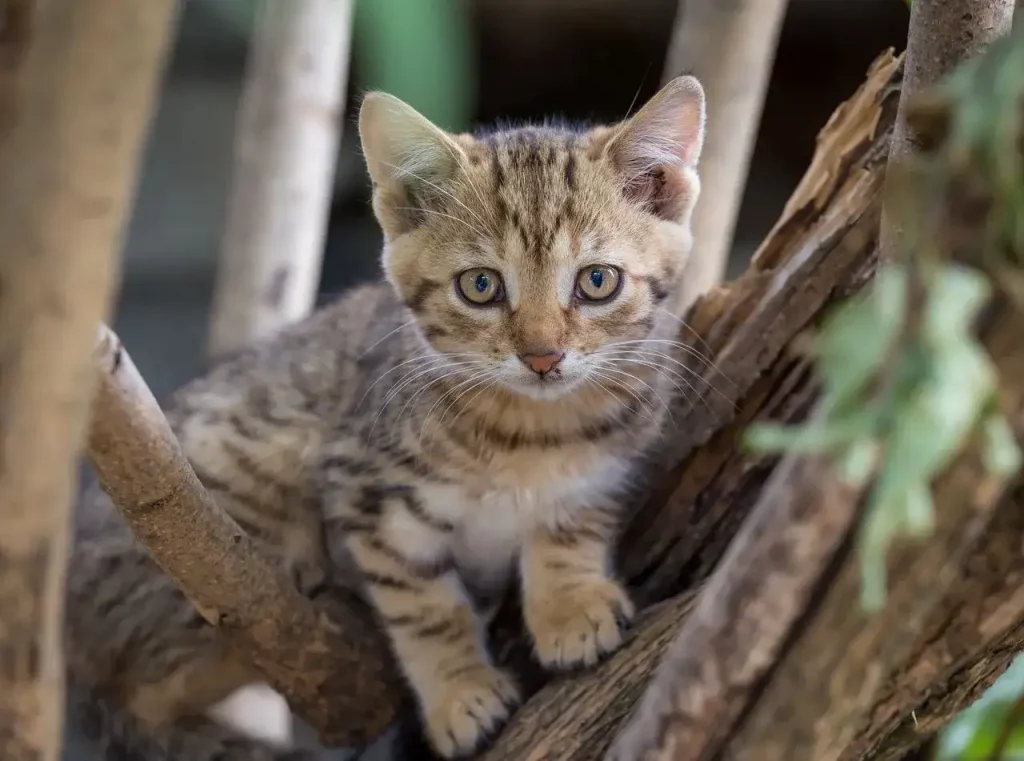
Kittens will also meow for other reasons, such as an invitation to play. This takes the form of a high-pitched meow repeated several times and will be coupled alongside friendly body language: like tail wagging, tongue lolling, and the classic “butt up in the air” pose.
Likewise, cats can use their meows to indicate excitement, such as when their owner comes home from work, or when they come into contact with other cats.
Additionally, meowing is often used as a form of greeting. Many cats will do this when they spot another cat they are familiar with, even if they are across the street from them at the time.
This can come off as aggressive to some owners, however, it is usually just a cat’s way of saying hello, or alerting other cats to their presence.
Handy Hint: It might seem like your kitten is sleeping more than usual, but it’s perfectly normal for kittens to sleep all the time.
Why do kittens meow in their sleep?
You might also have noticed your kitten meowing in its sleep. This is nothing you should worry about and is completely normal behavior. It can be tempting to wake them when they do this, but just like us, cats have dreams, and these are often accompanied by movements and noises.
For example, alongside meowing, kittens might whine, yowl, or growl when they are sleeping. Additionally, their ears might twitch, they may shake, or their legs might mimic running. But it is really important to not wake them up in the middle of their sleep cycle, even if they are experiencing this.
Interestingly, it is more common to hear smaller breeds of cats meowing in their sleep compared to larger breeds. Smaller breeds tend to dream around every 10 minutes, whilst larger breeds tend to dream every 90 minutes.
However, kittens of both breeds will dream a lot more than their adult counterparts, as will older cats.
Meowing happens when a feline is deep into its REM cycle, a phase of sleep unique to humans and other mammals (as well as birds).
Characterized by rapid and random eye movements, REM sleep is directly responsible for a kitten’s dreams.
However, unlike humans, kittens enter REM sleep more often, and this causes them to dream more regularly compared to us humans.
Conclusion
The bottom line is, most kittens will start to meow around 8 weeks of age. Some can go on to become big meowers, meowing at strangers at the door constantly – or any other trigger.
Some kittens won’t start meowing at all.
My cat is now 4 years old, and I’ve only ever heard him meow about five times in his life.
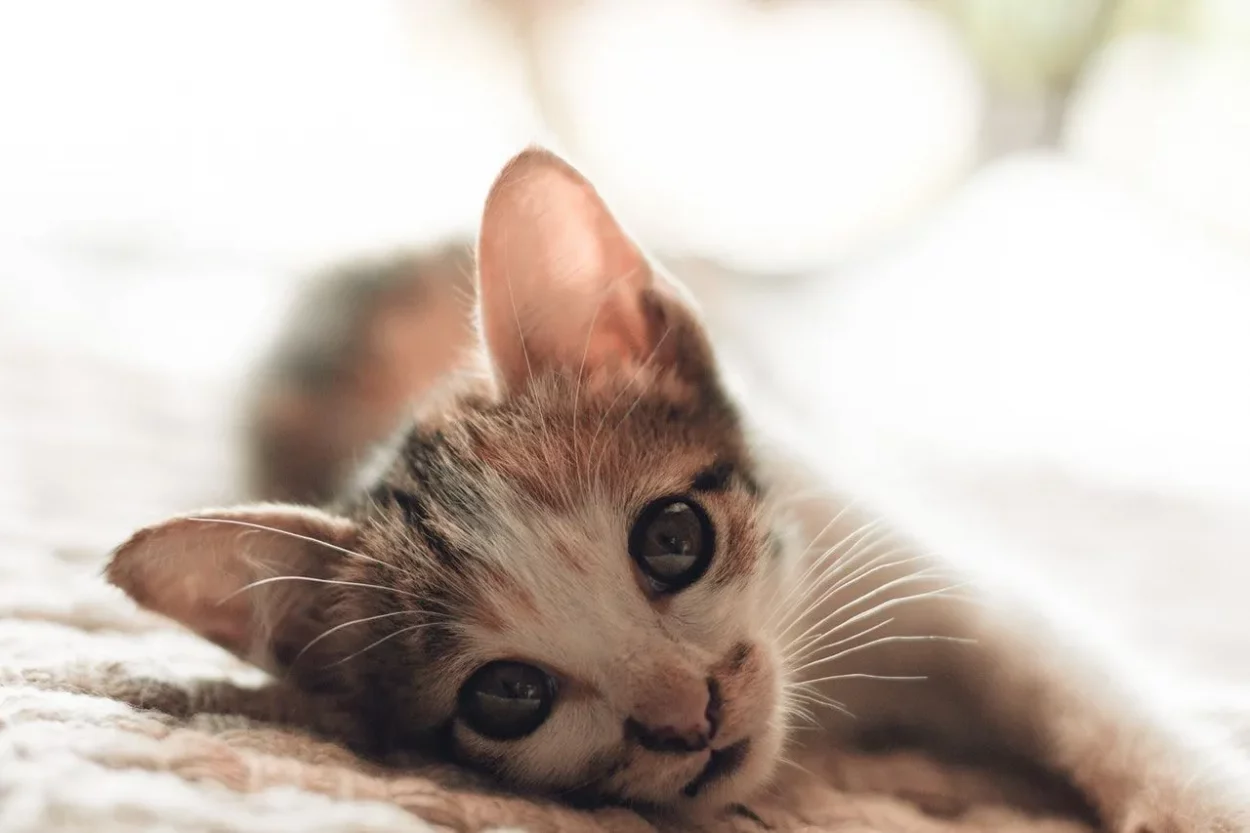
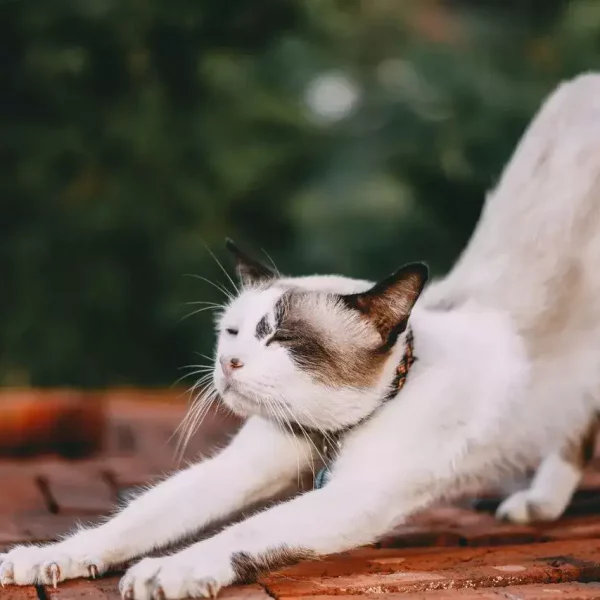
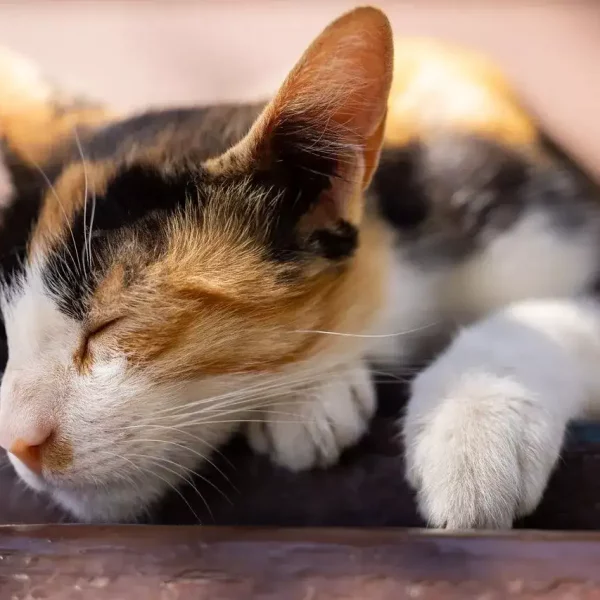
Leave a Comment